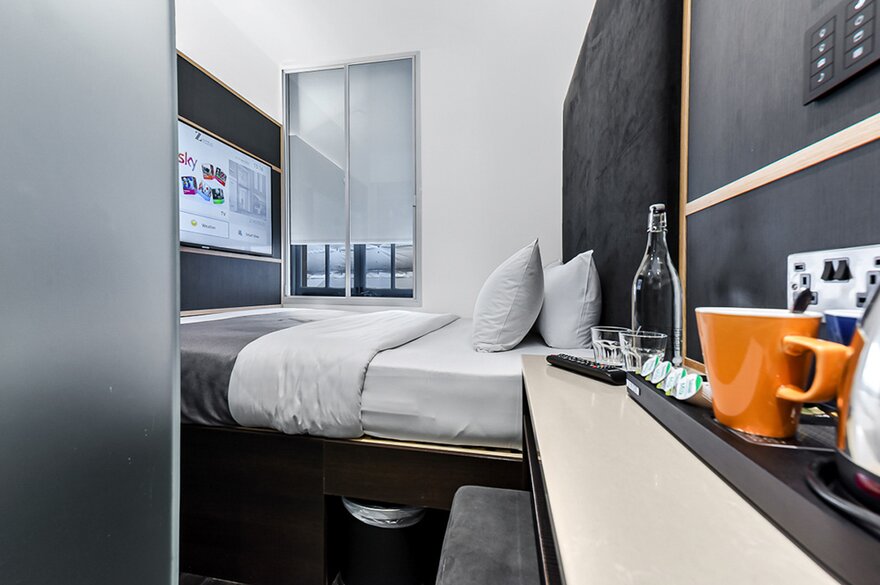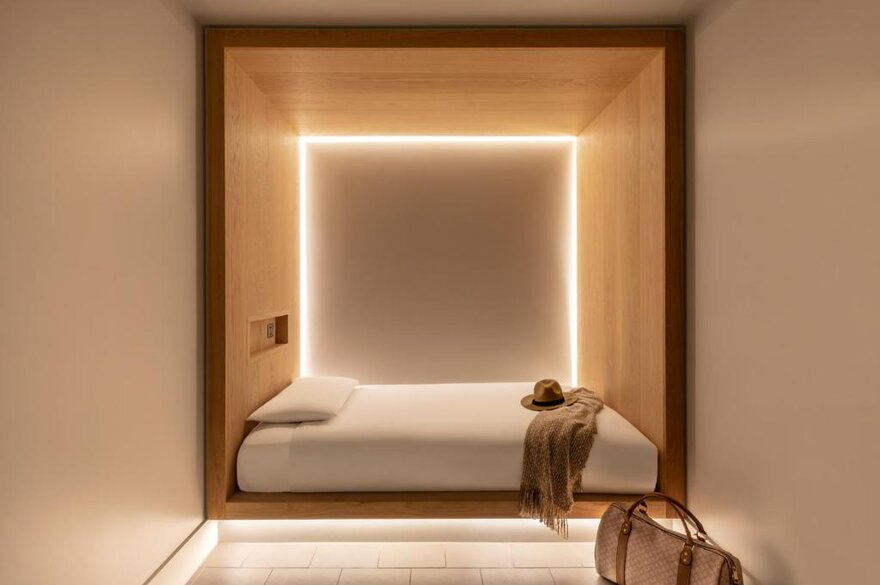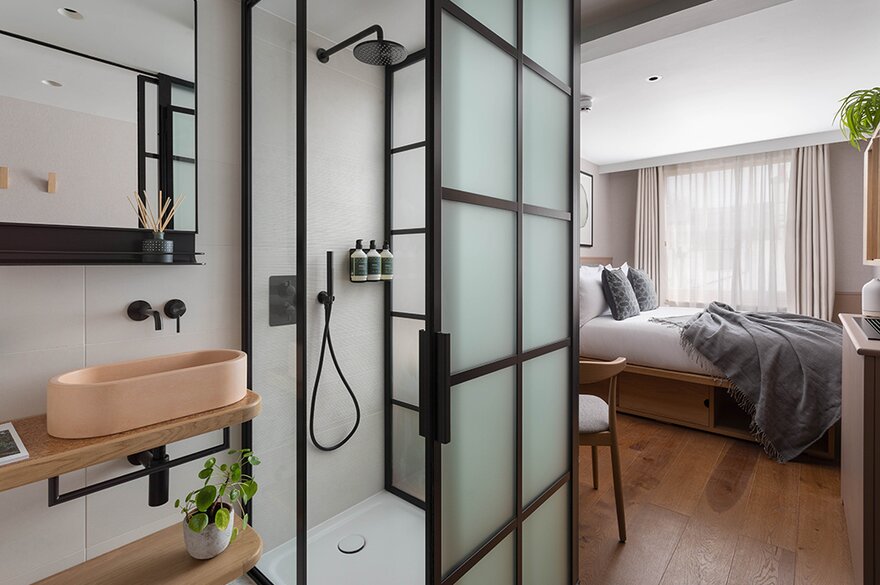Maximising a minimal amount of space is key to squeezing in customers without feeling cramped. Here's how hotels are offering minute hotel rooms in great locations for a fraction of the cost
What do you really need for a good night's sleep? It's a question that hoteliers obsess over and arguably none more so than those looking to craft the perfect conditions for rejuvenation in the smallest of spaces.
Bev King, owner of Z Hotels, coined the term "compact luxury" when the group opened its first hotel in Moor Street in Soho, London, in November 2011. King developed a model that brought small, affordable bedrooms to prime locations without sacrificing touches of opulence.
Z Hotels was born while the economy still bore the scars of the 2008 financial crash and profitability was front of mind and King's response was to unshackle himself from the rigid formula linked to the hotel ratings systems. Bathtubs were out, windows were no longer considered a necessity and neither was having access to a bed on three sides. Eschewing these accepted parameters allowed the size of rooms to be halved to 10-11 sq m, immediately doubling the number of keys a building could accommodate.
King explains: "By doing these things we could take properties in A1 locations and make them commercially viable. We could convert poor-quality office buildings into fantastic hotels and make money by offering value in amazing locations."
The Z Hotel Soho was completed in time for the 2012 London Marathon, a test event for that year's London Olympics. By the end of that weekend it was sold out for the duration of the games. King says: "It was an oh my God, amazing moment. That pushed us on to build new properties and was definitely a catalyst for future growth."
The model model
He is not alone in exploring the potential of the model. Zedwell, owned by asset management company Criterion Capital, opened a 750-bedroom hotel in the Trocadero building in the heart of London's Piccadilly in February 2020. It has since opened properties in Tottenham Court Road and Greenwich.
Darija Aziz, head of interior design at Zedwell, created the specification for Zedwell's rooms, which have an average size of 10 sq mand no window as standard. The rooms, known as ‘cocoons', contain nothing but a bed, storage space for luggage and a few hooks to hang an evening outfit. There's no TV, artwork or clutter to distract from a blissful night's sleep – something that has been developed as the group's mantra.
Despite being scant in features, Aziz created a distinctive design using neutral tones, natural timber and ambient LED lighting. Each roomis fitted out onsite by a team of carpenters.
The starting point for the group was to determine what guests really needed and what was superfluous. "The idea was to try and show people what's essential for sleep," Aziz says.
"Sleep is the primary reason for hotels to exist, particularly in central London, where people are outside for most of the day and night. By default, we have pitch-black rooms because we don't have windows. The second thing we have by default is noise reduction. No matter how much you glaze a window there's always noise from outside, but without windows, you get rid of that."
Aziz then examined the way each sense would respond to the space. Touchpoints were intuitive, the light was set at a warm 2700k, a signature bergamot and lavender scent was developed and guests were provided with guidance for getting a good night's sleep including links to meditation techniques.
She adds: "A good night's sleep is more than a good mattress, a soft or hard pillow or Egyptian cotton bed linen. It's a mindset – it's what happens when your brain is ready to relax.
"We spent years trying to create a perfect environment for relaxing that would make people feel safe. There's nothing in the room that can take your attention away from focusing on sleep. At the same time as reducing clutter, we have enhanced the quality of what remains to make people feel good."
Small budget
Other hotel groups including Inhabit and Hoxton have also seen the potential in offering a compact room category to appeal to cash-conscious guests, solo travellers or those looking to stay for only one or two nights. The Hoxton has a 12 sq m ‘shoebox' room advertised as "built for one-night stays and solo trips".
Chief operating officer Rob Andrews says: "Shoebox rooms have always been part of the Hoxton's DNA, since the beginning. We wanted to be transparent with the name to clarify that yes, they are small, but nevertheless they have remained a hugely popular room category across all of the hotels in which we have them.
"They are, of course, one of our most affordable room categories, which means they're the most accessible for those travelling on a tighter budget. But they are also a popular option for single travellers or guests with busy schedules who want a bed to crash in for the night."
Alexander Robinson, director of industry partners at market data specialist STR, says the appeal of such bedrooms has been proved in the performance of the affordable sector following the Covid lockdowns. He says: "Economy hotels are the only ones to have completely recovered on occupancy and on the rate front they're in second position [behind luxury]. It goes to show that coupled with the fact they can get occupancy back, consumers are prepared to pay for a quality product."
Robinson believes the sector is also likely to show resilience to the cost pressures being faced by consumers. He adds: "Economy hotels are well-positioned because they also catch those who trade down when they need to. So they have that core base and then also flex up, particularly if they have some of those nicer product offerings."
Luxury-lite
When King developed the model for Z Hotels he wanted to show that those touchpoints of luxury – a great mattress, duvet and bedsheets – could be incorporated into a compact space to provide a premium stay. Each room also has a 50-inch HDTV with all channels available, high-speed Wi-Fi and state-of-the art, in-room controls as standard.
Hoxton's global vice-president of design, Charlie North, has a similar attention to detail. He says: "The key to designing small spaces is to be really careful with the orientation and size of the furniture. It's important to make sure the room has everything you need without compromising but avoid it feeling crowded. Ensuring the quality of the finishing isn't sacrificed also helps small still feel special."
For Aziz, stripping back bedrooms and encouraging guests to use them for nothing but sleep meant public spaces needed to be able to cater for all other requirements, be it working, exercising or chatting over a coffee, while still being in-keeping with the hotel's wellness mantra. Its flagship Piccadilly site has a yoga studio, gym and lounge area, while the reception is designed to counter the bustle of one of London's busiest thoroughfares.
Aziz says: "I wanted people to walk into the reception and think ‘wow, I didn't expect this in central London'. We offer a huge feeling of natural, clean air [delivered by the hotel's purification and ventilation systems], a nice relaxing scent and nice music. Everything is curated for people to relax after coming in from the buzz outside."
Inhabit hotels, which offers an 8-12 sq m sleeper room with a single bed and a 10-18 sq m cosy room with a double bed, has a calendar of events, talks, workshops and classes for guests to attend, as well as libraries and a spa at its Queen's Gardens hotel in London.
At Z hotels King has taken an alternative approach, encouraging guests to get out and explore the city from its central locations, which incorporate just a small reception area and 24-hour café. He explains: "We don't have function rooms or restaurants. All our hotels are surrounded by hundreds of bars, restaurants and cafés and we don't want to compete."
As STR's Robinson observes, the model has proved itself. Z Hotel's London sites operate at 99% occupancy with an average stay of 1.8 nights. King says that rates in 2023 were "pretty static" on 2022 and the group's cheapest rooms on a Sunday night can be as low as £60, with an average room rate being around £150 to £200. When setting rates his priority is to look in the immediate geographical area, across categories, believing that guests seeking to stay in a city begin their searches by looking at a map.
He adds: "For me, the key component is offering better value for money. People are pleasantly surprised that staying in a smaller hotel doesn't mean compromising on quality."
Inhabit hotel's 8-12 sq m sleeper rooms have an average daily rate of £175 (compared to £235 across all categories), with an average length of stay of four to five days. Samantha Van Exter, head of hotels for owner Montcalm Collection, says: "Our sleeper rooms are very popular with short-stay, solo travellers, who are looking for a comfortable, affordable option in central London that offers much more than your cookie-cutter large chain.
"Our guests love the sense of calm Inhabit creates and the thoughtful touches included in our room experience. All our guest rooms and suites are curated with an array of amenities aimed at promoting wellbeing and relaxation. From on-demand meditation videos to bespoke aromatherapy and Naturalmat mattresses, we prioritise the holistic wellness of our guests."
The growth of the small hotel room looks set to continue. Z Hotels will open a new site in Leicester Square with a maximum of 95 rooms later this year and King says he would ideally like to open one or two more sites in the next 12 to 18 months. Leicester Square will be the 15th UK opening for the group, which now offers more than 1,700 rooms across London, Liverpool, Bath and Glasgow. King is considering more openings outside of London, continuing the group's model of converting former office blocks, colleges and similar buildings. He says: "It needs to be a city that already has a good average rate and a good level of occupancy as well as really good infrastructure."
A further Zedwell hotel is under construction in Marble Arch and last year planning permission was granted to add an additional 84 rooms to its Piccadilly site, while existing hotel operators continue to follow suit and incorporate smaller rooms at lower rates, be they named shoebox, nest or crash pad.
As King says: "Compact luxury is here to stay."
How hotels are marketing their small rooms
Mimi's hotel Soho's mini (7 sq m)
"Designed compactly and features a double bed. Perfect for singles… or for couples in love and without luggage"
The Ned London's crash pad (17-19 sq m)
"Made with impromptu plans in mind, Crash Pads are intimate and comfortable spaces, ideal for short stays. When booked directly these rooms include access to Ned's Club Gym and Spa, subject to availability."
Ruby Zoe's nest room (14-17 sq m)
"If you're just after a comfy bed, a powerful shower and our signature lean luxury touches, a compact nest room is the one for you. The 160cm-wide bed is extra-long and has luxurious oversize bedding and most Nest rooms also have a wardrobe. You'll be overlooking either Notting Hill Gate or a small residential street."
Inhabit hotels' sleeper rooms (8-12 sq m)
"A cosy space with a single bed to unwind in. This is the smallest room type in our hotel, with a snug, calm feel. These soothing rooms were designed with a good night's sleep as the priority, from the serene colour scheme to the natural materials and artful furniture."
Georgian House Hotel's tiny single
"Our tiny single rooms have been given a contemporary twist yet provide all the style and home comforts you would expect from a boutique experience. All of our rooms differ in shape and size, but you can find everything you need within reaching distance, ideal for a short stay in the capital. Our tiny single rooms are ideal for businesses travellers or those looking for a short, comfortable stay in a central London location."
Continue reading
You need to be a premium member to view this. Subscribe from just 99p per week.
Already subscribed? Log In












